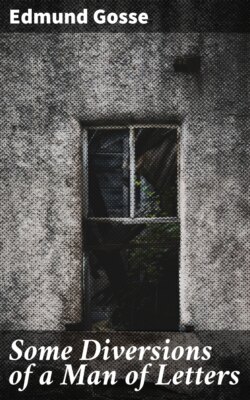Читать книгу Some Diversions of a Man of Letters - Edmund Gosse - Страница 6
На сайте Литреса книга снята с продажи.
Оглавление"Not a friend, not a friend greet
My poor corpse, where my bones shall be thrown!"
It is in these subtle lyrical amalgams of humour and tenderness that the firm hand of the creator of character reveals itself.
But it is in The Tempest that Shakespeare's supremacy as a writer of songs is most brilliantly developed. Here are seven or eight lyrics, and among them are some of the loveliest things that any man has written. What was ever composed more liquid, more elastic, more delicately fairy-like than Ariel's First Song?
"Come unto these yellow sands,
And then take hands:
Curtsied when you have, and kiss'd—
The wild waves whist."
That is, not "kissed the wild waves," as ingenious punctuators pretend, but, parenthetically, "kissed one another—the wild waves being silent the while." Even fairies do not kiss waves, than which no embrace could be conceived less rewarding. Has any one remarked the echo of Marlowe here, from Hero and Leander,
"when all is whist and still,
Save that the sea playing on yellow sand
Sends forth a rattling murmur to the land!"
But Marlowe, with all his gifts, could never have written the lyrical parts of The Tempest. This song is in emotional sympathy with Ferdinand, and in the truest sense dramatic, not a piece of pretty verse foisted in to add to the entertainment.
Ariel's Second Song has been compared with Webster's "Call for the robin redbreast" in The White Devil, but solemn as Webster's dirge is, it tolls, it docs not sing to us. Shakespeare's "ditty," as Ferdinand calls it, is like a breath of the west wind over an æolian harp. Where, in any language, has ease of metre triumphed more adorably than in Ariel's Fourth Song—"Where the bee sucks"? Dowden saw in Ariel the imaginative genius of English poetry, recently delivered from Sycorax. If we glance at Dry den's recension of The Tempest we may be inclined to think that the "wicked dam" soon won back her mastery. With all respect to Dryden, what are we to think of his discretion in eking out Shakespeare's insufficiencies with such staves as this:—
"Upon the floods we'll sing and play
And celebrate a halcyon day;
Great Nephew Aeolus make no noise,
Muzzle your roaring boys."
and so forth? What had happened to the ear of England in seventy years?
As a matter of fact the perfection of dramatic song scarcely survived Shakespeare himself. The early Jacobeans, Heywood, Ford, and Dekker in particular, broke out occasionally in delicate ditties. But most playwrights, like Massinger, were persistently pedestrian. The only man who came at all close to Shakespeare as a lyrist was John Fletcher, whose "Lay a garland on my hearse" nobody could challenge if it were found printed first in a Shakespeare quarto. The three great songs in "Valentinian" have almost more splendour than any of Shakespeare's, though never quite the intimate beauty, the singing spontaneity of "Under the greenwood tree" or "Hark, hark, the lark." It has grown to be the habit of anthologists to assert Shakespeare's right to "Roses, their sharp spikes being gone." The mere fact of its loveliness and perfection gives them no authority to do so; and to my ear the rather stately procession of syllables is reminiscent of Fletcher. We shall never be certain; and who would not swear that "Hear, ye ladies that are coy" was by the same hand that wrote "Sigh no more, ladies," if we were not sure of the contrary? But the most effective test, even in the case of Fletcher, is to see whether the trill of song is, or is not, an inherent portion of the dramatic structure of the play. This is the hall-mark of Shakespeare, and perhaps of him alone.
